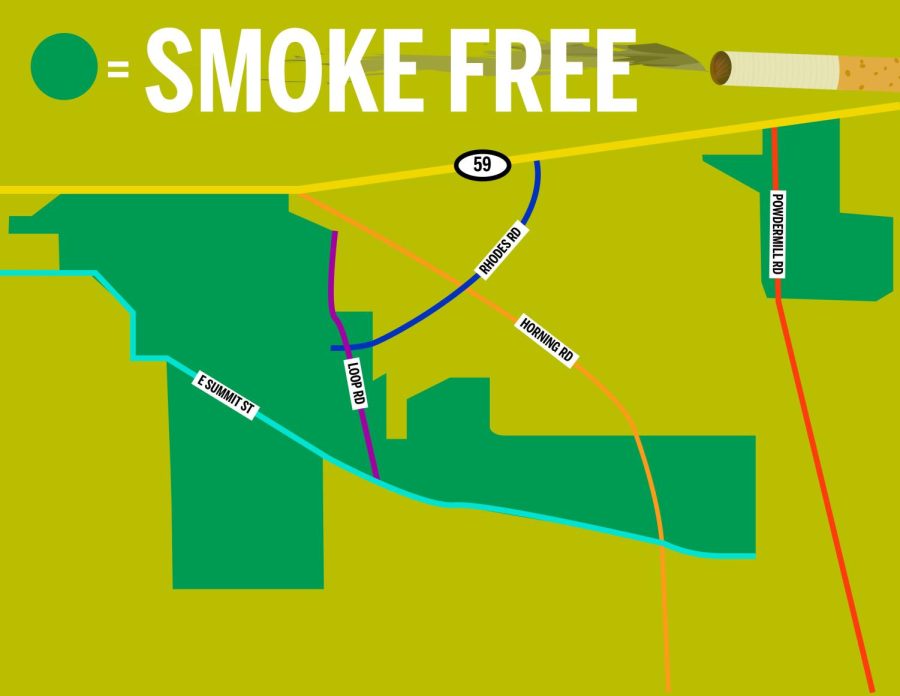Clearing the air: Kent State goes smoke-free
June 23, 2017
As of July 1, Kent State is the 26th college in Ohio to become a smoke-free and tobacco-free campus, according to the Ohio Department of Higher Education.
“By building a culture of health, we are hoping to decrease the number of smokers here on this campus,” said Shay Little, vice president of Student Affairs. “If our campus is smoke free, smokers will smoke less per day since they do not have access to areas where they can smoke. Our goal is not to punish smokers but to help create a healthier lifestyle.”
In an email sent to the Kent State community on Wednesday, university President Beverly Warren stated the policy is in line with the administration’s healthy campus initiative.
“The health and wellness of our Kent State family are high priorities with significant benefits,” Warren wrote. “Studies also have shown immediate health benefits to stopping smoking at any age. It’s never too late to quit!”
The ban takes place on all Kent State property — owned and leased. The policy applies to Kent State students, staff, volunteers, contractors and vendors working with the university. It also applies to visitors who enter any university property, as stated on Kent State’s website.
Smoking in a car on Kent State property is another factor of the policy — it’s prohibited.
The ban not only applies to cigarettes, but also to cigars, e-cigarettes and all forms of smokeless tobacco.
According to a KentWired Twitter poll, out of 483 votes, 72 percent voted in favor of the ban.
How do you feel about the smoking ban on Kent State’s campuses, effective July 1?
— KentWired (@kentwired) June 20, 2017
There are others who feel the ban is unnecessary, like Jakob Rees, a freshman fashion design major.
“I pay to go to school here just like everyone else, so I shouldn’t have to walk all the way off of campus in order to smoke a cigarette in between my classes, especially since smoking is legal,” Rees said. “I don’t necessarily care if others disagree with my actions.”
Since the ban applies to all eight campuses, the university plans to administer resources for students and employees to address smoking habits.
Enforcement and consequences
Even though there’s a push to eliminate smoking on campus, there isn’t a designated team to help enforce the ban, Little said. There is an “implementation team” — people who assisted in the implementation of the policy.
“We are not going to have the smoking brigade out on campus looking for individuals to smoke,” Little said. “What we, as a university, hope is the community will buy into the fact that we want to have the healthiest campus.”
There won’t be major consequences, Little noted. Those who are caught smoking on campus will be reminded of the policy and will be asked to comply, but students who consistently violate the policy, they could be referred to student conduct, as stated on Kent State’s website. If employees fail to comply, it will be handled through employment procedures.
For some students, like senior communication studies major Abigail Heslep, the enforcement policy doesn’t seem strong enough.
“I understand that smoking is an addiction, and since there won’t be major punishments, I feel like many smokers won’t respect the rules,” Heslep said. “The university should have considered designating certain areas for smokers to smoke on campus to prevent this from happening, but I guess the university will wait and see if the consequences are effective or not.”
In Fall 2016, the American College Health Association performed a National College Health Assessment for Kent State. It took the course of 30 days and out of the 3,526 who responded, most showed they have never used tobacco.
Resources for smokers
The university offers eight smoking cessation sessions through the American Lung Association’s Freedom from Smoking program. The program helps individuals quit smoking by identifying individual’s triggers, teaching relapse prevention and providing tips on controlling stress, among other things.
“Students can go through (the Office of Health Promotion) at University Health Services. That can be their outreach point,” said Kim Hauge, director of Employee Wellness in the Division of Human Resources. “We have a designated website for all resources available.”
The sessions, located at DeWeese Health Center, include group and individual sessions. The program is free for all students and employees.
“If you choose, if you are ready to quit, (and) if you are ready, we have the resources to help you,” Hauge said. “We have even added nicotine replacement therapy into our drug prescription program for coverage, so there will not be cost barriers.”
The CVS Health and CVS Minute Clinic in downtown Kent offers nicotine replacement therapy (NRT) for employees and their dependents who have insurance coverage.
The university aims at making the policy cost-free for employees and students.
“We don’t want employees or students to enquire any additional costs. A lot of times that is the stumbling block for them if they need nicotine replacement therapy. We encourage them to work with their medical primary care physician use these resources and know they will be supported” Hauge said.
Hauge expressed excitement about the policy and hopes those on campus use the resources available to them.
“We are ready to go. We feel confident that we have taken the correct measures, (and) we will continue to evaluate as we continue to move forward,” Hauge said.
Mariel Zambelli is a reporter, contact her at [email protected]
Holli Phillips is the health and wellness reporter, contact her at [email protected]
Lydia Taylor is the editor-in-chief, contact her at [email protected]












